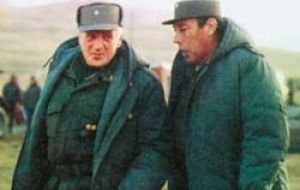MercoPress. South Atlantic News Agency
Argentina declassifies scathing review of blunders committed during Malvinas war
 The Rattenbach report pays no tribute to Argentine commanders or how they treated their own soldiers
The Rattenbach report pays no tribute to Argentine commanders or how they treated their own soldiers President Cristina Fernandez has finally declassified a scathing review of the mistakes made by Argentina's military junta in going to war with Britain in 1982 trying to recover the Falkland Islands.
The Rattenbach Report is so critical of Argentina's military leadership that the last dictator ordered it kept secret for 50 years.
By making it public, Cristina Fernandez said she hopes to show Argentina “will always be on the side of peace.” She also said very little of the report needed to remain classified — just the names of an active Argentine intelligence agent and an Islander who collaborated with Argentine forces.
Fernandez has sought to blame the 1976-1983 dictatorship and not the Argentine people for the failed war, while at the same time using non-military means in hopes of squeezing Britain into negotiating the Islands' sovereignty.
A version of the report was leaked decades ago, and its conclusions are not a surprise: The junta planned for an easy occupation, gambling the US would support them and Britain would simply let the Islands fall into Argentine hands.
Then Argentina's ill-equipped army had to scramble into a war footing after British Prime Minister Margaret Thatcher sent a task force 13.000 kilometres into the South Atlantic to take the Falklands back.
The report confirms Argentine soldiers were sent from the subtropics into winter conditions without proper clothing, food or weapons, and were treated as cannon fodder by their own officers — pushed into battle without having had basic training in weaponry and combat.
“Troops weren't adapted or equipped to handle the weather or the living conditions,” and yet they had to face “a highly equipped and trained enemy,” the report concluded. “Military commanders encouraged the preconceived notion that there would be no armed conflict, and that the situation would be resolved diplomatically, which affected the morale of the forces and their readiness for combat.”
The Argentine occupation began on April 2, 1982, and ended 74 days later with British troops crushing the ill-prepared Argentines, at the cost of more than 900 lives.
Why air the report now, just ahead of the 30th anniversary?
“There's a need to close a historical chapter, and raise the human rights aspect of the Argentine military,” Argentine political analyst Vicente Palermo said Friday. He added that President Cristina Fernandez is “trying to focus responsibility on the military and leave the Argentine people blameless.”
“But you have to take into account that when you open this period to examination, you open up many more things, such as the support that the armed forces had from the Argentine people at the time,” Palermo added.
Indeed, many Argentines answered the junta's call for mass rallies in favor of a military occupation, and gave family jewellery to the war effort




Top Comments
Disclaimer & comment rules-

-

-

Read all commentsI cant see what this will achieve except to remind people once again how useless the RG's really are. Pathetic.
Mar 24th, 2012 - 08:53 am +1What normal country commemorates the start of a war which they lost so disastrously? Maybe they are commemorating the events which led to the the restoration of the Argentine version of democracy.I can see KFC announcing that a statue of Mrs Thatcher,the new 'El Libertador' ' is going to be installed in the Plaza De Mayo.
Mar 24th, 2012 - 09:18 am +1Can you imagine the reaction in Europe if Germany announced it was going to commemorate the invasion of Poland and then Adolf Hitler's birthday.
@2 “He added that President Cristina Fernandez is 'trying to focus responsibility on the military and leave the Argentine people blameless.' ”
Mar 24th, 2012 - 09:21 am +1I can imagine on the 2nd of April they will all be out in the streets pretending that there weren't millions of people out on the streets in 1982 in a festival of popular support to the invasion of the Falklands. Instead they'll pretend they didn't lose the war and they'll pretend the military junta was acting against the wishes of the argentine people.
It's just typical of the one big bed of lies in which these people live.
Commenting for this story is now closed.
If you have a Facebook account, become a fan and comment on our Facebook Page!